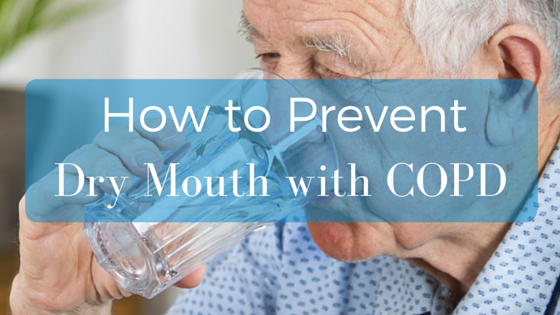
Going throughout your day or being abruptly woken from a deep sleep due to dry mouth, is something that doesn’t get much attention, but it affects a large portion of patients with COPD on a regular basis.
Dry mouth (xerostomia) is a condition that causes your mouth to feel parched of all moisture. Often times making it difficult to swallow, taste, or chew food.
Though this lesser discussed symptom is not as drastic as many of the other COPD related symptoms, dry mouth is equally as annoying as it is disruptive.
Often the cause of frequent dry mouth can be directly attributed to the treatment methods you use for your chronic obstructive pulmonary disease.
But that isn’t always the case. Sometimes it can be due to the consumption of select foods and beverages.
Today we will give you the necessary information on what can be causing your cumbersome dry mouth, while also providing you with actionable tips to help you combat the annoyance and disruption oral dryness imposes.
The COPD Patients Outline for Preventing Dry Mouth
Before we jump into dry mouth treatment methods, we must first discuss what is causing your dry mouth.
We will then addressing the available options you have at your disposal to help reduce or even eliminate constant dry mouth so you can focus on treating your chronic obstructive pulmonary disease.
COPD Treatment Medications
Depending on your felt COPD symptoms or if there is a presence of an infection, your health care professional may prescribe a combination of medications to treat and manage your chronic respiratory disease.
These can include antibiotics, antidepressants, antihistamines, short-acting and long-acting bronchodilators, diuretics, or corticosteroids.
These are the most common classes of medications used to treat your COPD related symptoms, but did you know they can also be the root cause of your constant severe dry mouth?
Antibiotics
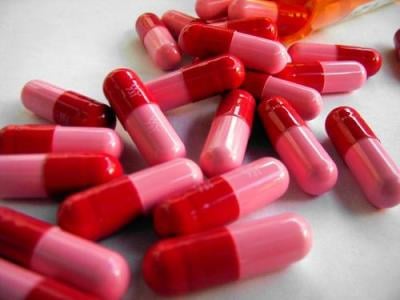
Antibiotics have an effective place in your COPD treatment if you’ve developed a respiratory infection such as pneumonia or experience frequent flare-ups (exacerbations).
Leaving bacterial infections untreated can worsen the severity of your current symptoms by causing them to flare-up.
Which means symptoms such as shortness of breath, mucus production, cough, and fatigue are worsened, only to further restrict your physical abilities.
Whether you have developed pneumonia or another bacterial infection due to a flare-up, your doctor will choose an appropriate antibiotic to fight off your specific infection.
If prescribed antibiotics, it’s extremely necessary for you to take the antibiotics as prescribed.
Failing to take them as prescribed can lead to the germs being weakened but not completely eliminated.
Resulting in antibiotic resistance that can lead to the infection coming back and exacerbating your COPD symptoms.
Antibiotics May Cause Oral Thrush
Although antibiotics will eliminate your infection, you may notice that your dry mouth gets increasingly worse as you take your meds.
In some cases, you may even notice that you are developing an infection in your mouth.
Don’t panic, some antibiotics can cause mild to moderate cases of thrush and it can easily be taken care of.
Antidepressants
The diagnosis of COPD and experiencing the felt symptoms associated with the lung disease, you may begin to develop signs of depression.
As the fact that you may no longer do the things you once loved sinks in, your mental state may suffer.
Combine those two things together with the number of lifestyle changes you are required to make and it’s easy to see why depression and COPD are commonly linked.
If you begin to experience symptoms of depression, your healthcare provider may prescribe an antidepressant.
Though there are many brands of antidepressants, the majority of them share one common side effect, dry mouth.
Antihistamines
Antihistamines are yet another common drug that patients with COPD use as apart of their overall treatment.
This type of drug helps to alleviate a runny nose, or red and watery eyes that are caused by allergies.
Antihistamine medications are available in various forms such as pills or nasal sprays, and are available in prescription and over-the-counter options.
Unfortunately though, when treating your allergies, antihistamines can also inhibit your body’s ability to produce mucus, amongst other side effects. Leaving you with the annoying sensation of dry mouth.
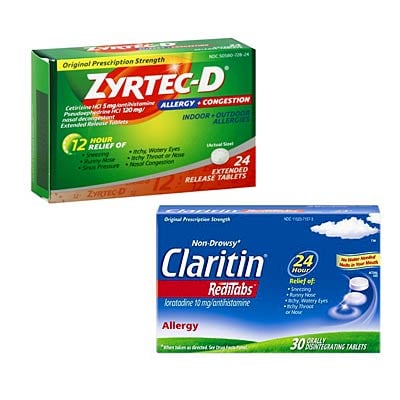
Bronchodilators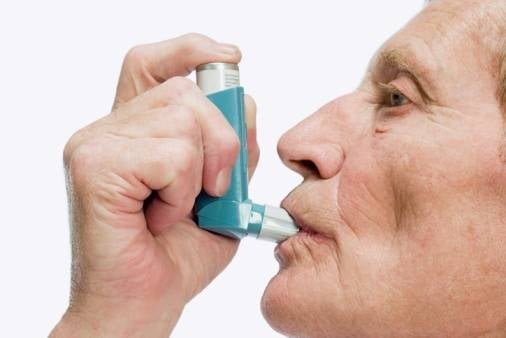
Bronchodilators are prescribed in either short-acting or long-acting inhaled options to help relax constricted airways to allow the most oxygen into the bloodstream, while allowing you to expel more carbon dioxide from your body.
If inhaled bronchodilators are not sufficient for treatment, your doctor may prescribe an oral bronchodilator.
Short-Acting Inhaled Bronchodilators
Often referred to as a “rescue medicine”, short-acting bronchodilators are fast working and go to work in minutes, but will only provide relief for 4-6 hours.
Short-acting bronchodilators are only used “as needed” when shortness of breath becomes unbearable.
Short-Acting Inhaled Bronchodilator Brands:
- Proventil
- Proventil HFA
- Ventolin
- Alupent
- Maxair
Long-Acting Inhaled Bronchodilators
Unlike its short-acting counterpart that is used as a rescue medicine in the event of worsening breathlessness, long-acting bronchodilators last about 12-24 hours and are used to control and manage your shortness of breath on a regular basis rather than “as needed”.
If you are prescribed a short-acting or long-acting bronchodilator, it may be the cause of your frequent dry mouth.
As dry mouth is a leading side effect of bronchodilators due to the medication inhibiting your salivary glands ability to produce saliva.
Long-Acting Inhaled Bronchodilator Brands:
- Spiriva
- Serevent
- Foradil
- Brovana
- Arcapta
- Tudorza
Diuretics (Water Pills)
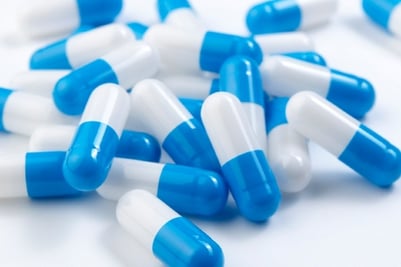
A common occurrence when diagnosed with chronic obstructive pulmonary disease is known as fluid retention. This is when your body retains excess water and as a result sodium.
Fluid retention causes water to accumulate in your face, hands, arms, feet, ankles and legs as a result of right-sided heart failure or what’s known as cor pulmonale.
What’s more, excess fluid can also accumulate in the abdomen, only to worsen the severity of breathlessness and discomfort by putting more pressure on your diaphragm.
Diuretics are prescribed to help prevent your body from retaining excess water. This is done by expelling excess water through urine.
However, these water retention preventing medications are well known for causing dry mouth due to them minimizing the activity of your salivary glands, causing less saliva to be present in your mouth.
Corticosteroids
Corticosteroids are prescribed after bronchodilators have failed to deliver adequate relief of breathlessness.
If you are prescribed a corticosteroid, whether inhaled or orally, these medications can cause increased dry mouth, voice hoarseness, or a yeast infection in your mouth.
Inhaled Corticosteroid Brands:
- Beclovent
- QVAR
- Vanceril
- AeroBig
Oral Corticosteroid Brands:
- Deltasone (Prednisone)
- Prelone
- Medrol
Combating Dry Mouth Caused By Medications
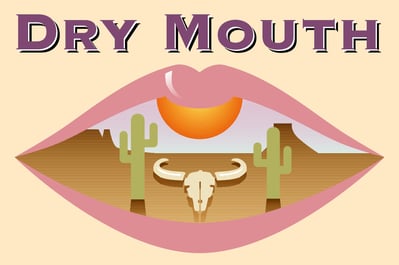
Now that we have discussed the varying types of medications used to treat your COPD that are well known to cause dry mouth. It’s time to discuss the methods your doctor may pursue to combat your medication induced oral dryness.
Medication Adjustments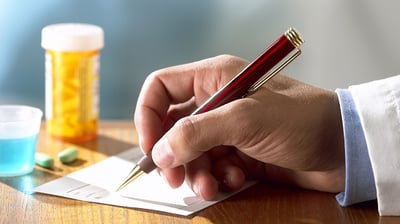
Keep a close eye as to which specific medication(s) are causing your mouth dryness and mention them to your doctor.
If they also conclude that your dry mouth is the result of your treatment medications, they may opt to switch you to another medication, adjust the dosage, suggest an artificial saliva substitute or dry mouth oral rinse.
Saliva Substitutes & Oral Moisturizers for Dry Mouth
There are a few types of products that your doctor may recommend to help add supplemental moisture to your frequent dry mouth.
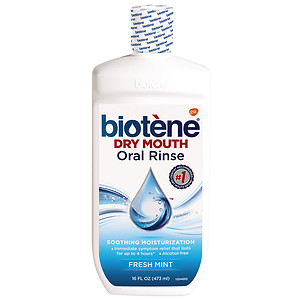 Products such as over-the-counter or prescription mouth washes, and lozenges such as Biotene Dry Mouth Oral Rinse, Oasis Mouthwash, or ACT Total Care Dry Mouth Lozenges.
Products such as over-the-counter or prescription mouth washes, and lozenges such as Biotene Dry Mouth Oral Rinse, Oasis Mouthwash, or ACT Total Care Dry Mouth Lozenges.
If mouthwashes or lozenges are not effective for you, Biotene also offers moisturizing oral gel, toothpaste, or nasal spray to combat your oral dryness.
It’s worth mentioning that when using mouthwashes, you should avoid alcohol based mouthwashes as they can further irritate your dry mouth. According to Colgate, "People who are experiencing xerostomia (dry mouth), can all benefit from using alcohol free mouthwashes".
Keep a Water Bottle Easily Accessible
Whether you are heading out to meet a few friends for lunch or doing some chores around the house, you should never go far without a water bottle.
Doing so will encourage you to get your daily water consumption while also providing immediate dry mouth relief at the first sign of oral dryness wherever you are.
Water consumption is a great way to help manage your other COPD symptoms as well, allowing you to kill two birds with one stone.
A great option is to carry your water bottle in one of the pockets on your portable oxygen concentrator’s carrying case.
Use of Medical Oxygen

A commonly used and very successful treatment option for shortness of breath caused by COPD is medical oxygen.
Whether using an oxygen tank, liquid oxygen, or a portable and home oxygen concentrator.
The delivery of medical oxygen is stripped of all moisture that can lead to dryness in your mouth, throat, and nasal passages causing dry mouth and a dry, sensitive nose.
It’s easy to compare this phenomenon to the act of sitting in front of a fan.
As you sit in front of the fan and air is forced in your face, your eyes begin to dry out. The same goes for oxygen therapy.
As you inhale your oxygen, the dry air makes contact with your nasal passages, airways, and mouth.
Since there is 0% humidity in the oxygen it draws the moisture from your body and eventually dries you out.
Treating Oxygen Therapy Induced Dry Mouth
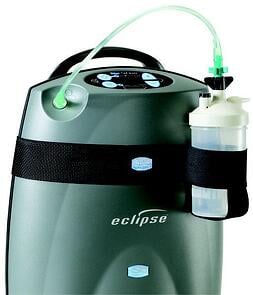 This painful and annoying occurrence is especially common if you are prescribed a continuous flow delivery of medical oxygen.
This painful and annoying occurrence is especially common if you are prescribed a continuous flow delivery of medical oxygen.
But with the use of a humidifier bottle attachment you can effectively reduce or prevent nasal, mouth, and throat dryness.
Simply put, a humidifier bottle attachment is filled with water and is then connected directly to your continuous flow oxygen concentrator.
Then before the flow of medical oxygen is delivered, the humidifier adds moisture to the oxygen so that it will not dry out your nose, throat, or mouth.
Note: Keep in mind, you can only use a humidifier bottle attachment with a continuous flow oxygen concentrator.
Dry Mouth Treatment for Pulse Flow Users
If you are unable to add a humidifier to your oxygen therapy treatment due to being prescribed pulse flow delivery, you can combat oral dryness by purchasing a standalone humidifier for your bedroom.
Whole house and single-room humidifier can go a long way in helping you cope with COPD symptoms ranging from breathlessness to dry mouth.
For the most part a single room humidifier will be more than enough. You can easily move them from room to room and they are fairly inexpensive.
You can read more about the benefits of humidifiers for COPD here.
Dry Mouth from Sleep Therapy Treatments
It’s unfortunate, but according to the Lung Institute approximately 10%-15% of COPD patients also have obstructed sleep apnea (OSA), which is then referred to as overlap syndrome.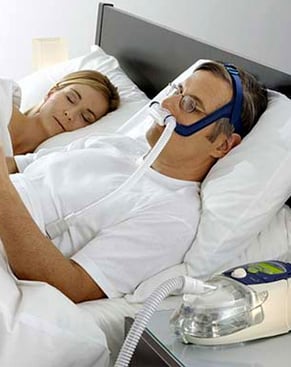
A tell tale sign of OSA is mouth breathing (snoring), but how do you know if you’re a mouth breather?
Well for starters, if you regularly wake up with your mouth as dry as a desert or your spouse mentions you frequently snore, you should speak with your doctor about getting tested for sleep apnea.
Whether you have recently been tested and diagnosed with OSA or you’ve had it for years, using your CPAP or BiPAP machine at night can also increase the frequency you experience oral dryness.
Oral dryness can be due to air leaking out the sides of your PAP mask or that you are simply sleeping with your mouth open (mouth breathing).
CPAP related mouth dryness is typically most prevalent in patients that use nasal masks or nasal pillows.
Sleep Therapy Dry Mouth Remedies
Use a Heated Humidifier
If you begin to notice a pattern of waking up in the middle of the night or in the morning with a dry mouth and throat that is continuous for part of or the entire day.
You should highly consider adding a heated humidifier attachment to your sleep therapy machine.
Just like with an oxygen concentrator humidifier, a PAP humidifier attaches directly to your sleep therapy machine to add a preset level or an automatically adjusted level of humidity to the therapy air before being delivered.
Of course the functionality of the humidifier varies from model to model, but all heated humidifiers are effective for dry mouth treatment.
Opt for a Full Face Mask
No matter if you have mouth leaks or not, the use of a full face PAP therapy mask will contain the air, so no matter if you breathe through your nose or mouth you will still receive adequate sleep therapy treatment.
While reducing or completely eliminating the annoying occurrence of sleep therapy induced oral dryness.
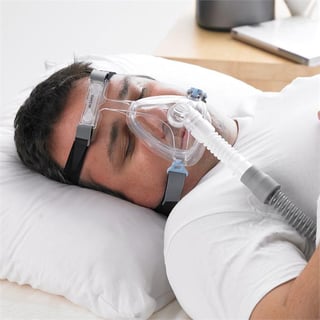
Stay Hydrated & Keep Water Close By
Before heading to bed, fill yourself a glass of ice water and keep it on your nightstand. This way, if you wake up faced with oral and throat dryness you can quickly take a few sips to rehydrate without needing to get up.
Just be mindful of the amount of water you’re consuming to prevent having to constantly get up and disrupt your sleeping pattern to go to the bathroom.
Sleep Therapy Dry Mouth Medications:
- XyliMelts for Dry Mouth: These little adhesive discs can be used day and night by simply sticking to the inside of your cheek. The discs will moisturize and lubricate your mouth by increasing saliva production. Helping to reduce sleep disruption and possibly lower your risk of tooth and gum decay.
- Biotene Oral Balance Moisturizing Dry Mouth Gel: Simply coat your mouth with this mouth moisturizing gel to help soothe and protect oral tissues and relieve symptoms of dry mouth. If the dry mouth gel doesn’t work, try Biotene mouthwash, mouth spray, or toothpaste.
- ACT Dry Mouth Lozenges: Mint flavored lozenges that you can suck on through the day to help combat oral dryness wherever you go.
Additional Contributors to Dry Mouth
Now that you know which medications and therapies can cause your dry mouth, we will now discuss the types of foods and beverages you should avoid to prevent the worsening of your chronic dry mouth.
Minimize the Consumption of Alcoholic or Caffeinated Beverages
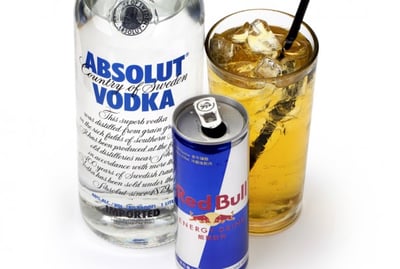
Do you drink soda, tea, coffee, energy drinks, or the occasional alcoholic beverage?
Did you know that they could be contributing to your constant fight against dry mouth?
Since you’re clearly aware that you suffer from oral dryness, show you’re dedication to combating the problem by avoiding the consumption of alcoholic or caffeinated beverages (coffees, teas, colas) as much as possible.
Alcohol and caffeine will only worsen your dry mouth due to the fact that they increase water loss due to frequently triggering urination. While consuming caffeinated or alcoholic beverages will only further dry out your mouth.
The Effects of Alcohol and Caffeine on COPD
If that doesn’t prevent you from drinking alcoholic or caffeinated beverages, you should consider the adverse effects that they can have on your COPD.
Let’s start off with caffeinated beverages, consuming excess caffeine can affect your sleep quality and patterns.
Worsening your daily levels of fatigue due to a lack of energy that can also impact your overall mood.
Additionally, many caffeinated beverages are also highly carbonated. Causing gas and bloating that can result in further breathing discomfort.
Alcohol consumption with COPD has also been associated with decreasing lung function. Drinking your favorite adult beverage can also harbor your ability to clear airway mucus, worsening your shortness of breath and leaving you more susceptible to respiratory infections.
What’s more is the fact that alcohol can have adverse effects when combined with your COPD medications, such as antibiotics and steroids.
Anxiety levels can also spike with regular alcohol consumption. You should be sure to also avoid household mouthwashes that contain alcohol.
Beverages that Combat Dry Mouth:
- H2O is King: Opt for water as it should always be your go to choice.
- Gatorade/Powerade: Both are loaded with the hydration replenishment power of electrolytes. Just limit yourself to how many you drink per day due to their high sugar content.
- Naturally Flavored Water: If you aren’t a fan of water because it has no taste, why not spice it up a bit? Cut some of your favorite fresh fruit up and let it soak in your water over night. In the morning you will have a refreshing and tasty drink waiting for you.
Avoid Spicy or Salty Foods
If you notice a common occurrence of daily dry mouth that is caused by the treatment of your chronic pulmonary disease, you should make it a priority to avoid spicy or salty foods as much as possible.
Not only is it well known that excessive sodium intake is bad for your COPD ridden health, but both salty and spicy foods are known to irritate oral dryness.
Tips to Manage Irritation Caused by Spicy/Salty Foods:
- Drink a glass of ice water to combat the irritation
- Suck on ice cubes, but do not chew on them to avoid damaging your teeth
- Drink a glass of milk
- Rinse your mouth out with water immediately after eating to wash out the salt & spiciness
Additional Dry Mouth Remedies
These lifestyle remedies can be used for the general management of your frequent dry mouth, whether induced by COPD treatments, medications, or food.
Keeping these dry mouth remedies in mind will help you better manage and reduce the frequency at which you experience oral dryness.
- Oral Lubricants: These include grape seed oil flavored with peppermint essence, Biotene Oral Moisturizing Gel, mouth spray or mouthwash, and OraHealth XyliMelts Dry Mouth Discs.
- Stay Hydrated While Eating: Depending on the type of food you’re eating, some may induce dry mouth more than others, but by consuming water or sugarless drinks during meals they will help make chewing and swallowing easier. Furthermore, it can also help improve the overall taste of food, encouraging you to eat more of those COPD friendly nutrients.
- Suck on Something Sour: When you consume something sour, the high acidity helps to jump start the lackluster performance of your salivary glands. Opt for sugar free candies, as sugar deteriorates your teeth and consuming excess sugar certainly won’t provide any benefits for your COPD treatment.
- Chew Gum: Chewing sugar free gum throughout the day will also help to stimulate your inactive salivary glands.
- Regularly Rinse Out Your Mouth: This is especially important after you eat, doing so will wash off the coating of food left behind on your tongue and help to better control the bacteria in your mouth. Preventing the bacteria from going back into your throat or bronchial tubes that can cause a symptom worsening infection. This is also a wise practice every time your mouth begins to feel dry.
- Purchase a Standalone Humidifier: Keep your home at the optimal level of humidity to reduce feelings of dryness in your mouth. Purchase a humidifier and keep it in your room and turn it on at night, if your dry mouth continues during the day, use the humidifier during the day and move it with you wherever you go or consider buying a few to keep in your most frequented rooms. Using a humidifier provides many other health benefits as well.
- Take Advantage of Lip Balm: An unfortunate symptom of dry mouth is dry lips that can lead to painful cracking or bleeding. Combat this with the moisturizing power of lip balm.
Side Effects Caused by Dry Mouth
It’s important for you to seek treatment for your chronic oral dryness, as leaving it untreated can lead to one or many of the following side effects:
- Tooth Decay and Gum Disease, Increased Plaque
- Mouth Sores
- Fungal Infection in Your Mouth (Oral Thrush)
- Coated Tongue
- Sores or Split Skin at the Corners of Your Mouth
- Cracked Lips
- Poor Nutrition Due to Having Problems with Chewing & Swallowing
- Lackluster Taste of Food
- Bad Breath
How to Prevent Tooth & Gum Decay Caused by Dry Mouth
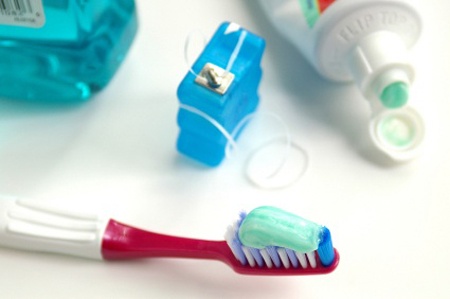
Keep in mind that saliva not only moisturizes your mouth, aids in the digestion of food, and helps make it possible for you to easily chew and swallow. Saliva also acts as a natural mouth cleanser of bacteria. A lack of saliva allows tooth and gum decay to thrive.
When faced with oral dryness, follow these tips to prevent the progression of tooth and gum decay:
- Always brush your teeth at a minimum of twice a day. The most effective frequency is after every meal and directly before bedtime.
- Floss multiple times a day.
- Stick with toothpaste that contains fluoride.
- Make regular trips to the dentist at least twice a year.
ConclusionFrequent dry mouth can be attributed to many different aspects of your treatment for chronic obstructive pulmonary disease, but you are now equipped with the knowledge to better assess the exact cause(s).
It’s important to not ignore the tell tale signs of dry mouth, and for you to instead mention your frequent oral dryness to your doctor so they can assess treatment options for your personal treatment. Something that causes other patients dry mouth may not be the direct cause of your’s.
What are some of your dry mouth remedies? Leave a comment below with some of your most successful dry mouth treatments to help teach others. Who knows, you may even learn a new tip that can be a game changer for your COPD related dry mouth.
If you found this article helpful, Share on Facebook to help other COPD patients struggling with dry mouth.

Related Blog Posts:



